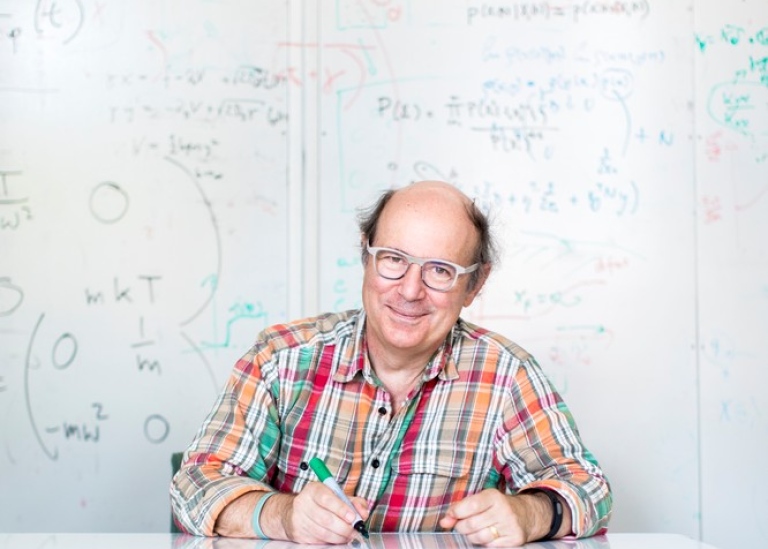 Renowned Physicist and Nobel laureate, Prof. Dr. Frank Wilczek, was chosen for the prestigious Templeton Prize for Progress in Religion. He is currently a theoretical physicist and mathematician at the Massachusetts Institute of Technology (MIT). The Templeton award for progress in religion was announced on May 11, 2022. This award is given to the persons who make important contributions to the understanding of God and religion through original scientific researches or through social and charitable activities. Former Prize Winners include Mother Teresa, Archbishop Desmond Tutu, His Holiness Dalai Lama, Francis Collins – former Director of Human Genome Project, etc. In terms of money, the Templeton award is always prized above the Nobel Prize. This is because as Sir John Templeton thought that the researches in religion is more valuable than all other researches.
Renowned Physicist and Nobel laureate, Prof. Dr. Frank Wilczek, was chosen for the prestigious Templeton Prize for Progress in Religion. He is currently a theoretical physicist and mathematician at the Massachusetts Institute of Technology (MIT). The Templeton award for progress in religion was announced on May 11, 2022. This award is given to the persons who make important contributions to the understanding of God and religion through original scientific researches or through social and charitable activities. Former Prize Winners include Mother Teresa, Archbishop Desmond Tutu, His Holiness Dalai Lama, Francis Collins – former Director of Human Genome Project, etc. In terms of money, the Templeton award is always prized above the Nobel Prize. This is because as Sir John Templeton thought that the researches in religion is more valuable than all other researches.
Dr. Wilczek is known for a number of discoveries in physics. His best known contributions include the discovery of asymptotic freedom (a special feature of the elementary particles, quarks), the development of quantum chromodynamics (the study of the colour properties of quarks) and the invention of axions (a hypothetical subatomic particle).
His contributions were recognized by several awards. In 2004, he was awarded the Nobel Prize in Physics. He shared the Nobel Prize with physicists David Gross and David Politzer for the contributions to the study of strong nuclear force. Apart from the Nobel Prize, he is a recipient of the King Faisal Prize in 2005 and the Lilienfeld Prize of the American Physical Society.
He has memberships in the US National Academy of Sciences, the Netherlands Academy of Sciences, and the American Academy of Arts and Sciences. He is also a gifted writer who writes on topics in physics for the larger audience. He has also published a number of popular books on science.
Wilczek’s physics professor, Peter Freud, introduced him to the mathematical theories of symmetry. Symmetry is the feature of a physical system having two equal halves that remain unchanged in transformations. These theories helped him find the ways to predict how the physical world behaves.
Dr. Wilczek considers Isaac Newton to be the most important scientist of all times. He also laid down the reasons as to why Newton is the greatest. Interestingly, he also highlights Newton’s interest and knowledge in Theology. Of Newton, Dr. Wilczek says, “Relative to his time, he operated on such a different level, and truly advanced science, in a way that it probably would have taken a hundred years otherwise. He did it almost in his spare time. He was at least equally interested in theology and Biblical criticism.”
Dr Wilczek is a prophet of harmony in science. He believes that the universe is basically made up of fundamental ideas. Universe behaves according to the fundamental ideas. In his book, Fundamentals: Ten Keys to Reality, Wilczek writes, “To experience the deep harmony between two different universes — the universe of beautiful ideas and the universe of physical behavior
— was for me a kind of spiritual awakening. It became my vocation. I haven’t been disappointed.”
He is a good philosopher and original thinker who blends science with philosophy and religion. He thinks that his deep philosophical insights are helpful to his scientific answers to the ultimate questions of humanity. Templeton Foundation, in announcing his choice for the award, rightly observed that “throughout his career, Dr. Wilczek, has used his exceptionally fertile scientific imagination to unveil previously hidden realities.”
For Wilczek, study of physics helps in understanding what God is. He says, “The central miracle of physics to me is the fact that by playing with equations, drawing diagrams, doing calculations, and working within the world of mental concepts and manipulations, you are actually describing the real world. If you were looking for trying to understand what God is by understanding God's work, that's it.”

As stated earlier, he is an advocate of harmony and beauty. In a recent interview, he shared his opinions on harmony and beauty. The idea of beauty is fundamental to creation. Beauty is present in the symmetric equations of the universe, He says, “Beauty has been a guide to successful theories in science and successful creations. It is very impressive because it works. The equations that you guess are based on aesthetic considerations. … Beauty is powerful and almost by definition is enjoyable. And it is a gift for us that the things we find enjoyable are what we find good for us. I don’t think it is an accident. It turns out that the concepts that work at the deepest level to understand what is going on among the most basic constituents of matter have a kind of mathematical purity and simplicity that is just gorgeous, because we do discover so much beauty in the symmetry of the world, and conceptual simplicity in the deep description of the world.”
For Dr. Wilczek, beauty is not something that is coming out of nothing. He sees a divine principle behind the beauty. “The next question is why. Why is that way? By studying God’s work, we discover what God is. In studying the laws and figuring out how the universe works we discover what reality is. In recent years I have been thinking more and more what it all means. Increasingly I am thinking not only what it is but what it is about. It is a kind of responsibility.” The statement of Dr Wilczek about beauty reminds us of St. Paul. “For since the creation of the world God's invisible qualities - his eternal power and divine nature - have been clearly seen, being understood from what has been made” (Rom 1:20).
Dr. Wilczek was brought up as a traditional Catholic. His scientific education helped him correct many of his literal and wrong understanding of Bible. His idea of God also got developed along with his science. Some people consider him to be an agnostic - one who thinks that we cannot know what God is. But, Wilczek has clarified that he is a sort of “pantheist.” Pantheist is someone who considers the entire creation to be the temple of God. His recent testimonies about his personal convictions on God and creation confirm this view.
About the Templeton prize, he said, “I think the intent of the Templeton Prize is very novel and timely and something the world needs. I am very very delighted to have that recognition and it is really something that I hope to live up to.”
It is commendable that a great physicist like Dr. Wilczek are able to see the complementary relationship between science and religion which is important for the meaningful living of humanity.